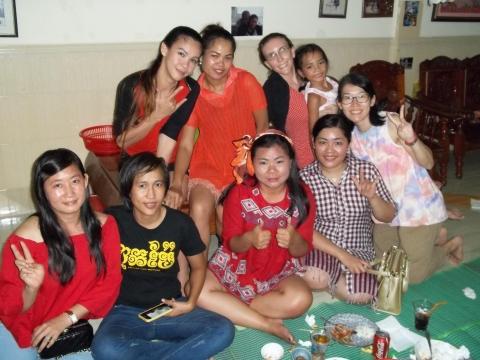
Karen Bortvedt Estrada, a returned Maryknoll lay missioner in Cambodia, reflects on how today's Gospel teaches us about a communal culture of care.
How does a parent not realize their child is missing for a whole day’s journey? I remember thinking this when I was growing up every time I heard this Gospel about Jesus’ excursion to the Temple, and now, as a “bonus” parent to a 15-year-old, I get stressed when he is out with friends for longer than even an hour.
When I began serving with Maryknoll Lay Missioners in Cambodia, a very familial and community-oriented culture in comparison to the individualistic-culture of the U.S., I saw for the first time how it could be possible to just trust the community with your child and not bother looking for him among the community. A child was not just the responsibility of the birth-parents, but also of the aunties, uncles, grandparents, older siblings, cousins, neighbors - literally the entire village. I remember discussing this Gospel passage once in a biblical traditions class, and the dynamics of a caravan of people in Jesus’ time were explained as something similar to what I witnessed daily in the lives of my colleagues, a beautifully dynamic chaos of people working together and sharing the load.
As I settled into this every-child-is-my-child-culture, I became an auntie to many of my friends’ and colleagues’ children. One of our staff members was a single parent and at times would bring her young daughter to work with her, when there was no one available that day to watch her. My colleague’s daughter became an influential part of my mission experience, as through the lonely moments and the hard times, I always knew when she came to the office I would be met with enthusiasm for the small things in life.
She and I would share my computer screen, half showing some YouTube video for her and half with whatever “important” work I was doing. Or she would take half my desk for her coloring (a whole tray in my paper organizer was stocked with coloring sheets and crayons) and I would use the other half to work (or color). Several other Cambodian colleagues would also support this mama and kiddo because there wasn’t much biological family around to do so. These simple, everyday moments, the trust in one another, and the community coming together to care for each other, have stuck with me years after returning from Cambodia.
What could our world and our country look like today if, on this Feast of the Holy Family, we could all embrace that we are part of a global family? How might our lives be transformed if we saw ourselves as auntie, grandma, father, sibling to one another, especially those separated from their birth-family by the chaotic caravan that is life? In a world where many of us live daily with the “great anxiety” Mary felt when she could not find Jesus, how do we all remember that we are in God’s house and, like the parents in that caravan, how do we have the faith that others are looking out for us?
Photo courtesy of Karen Bortvedt.
